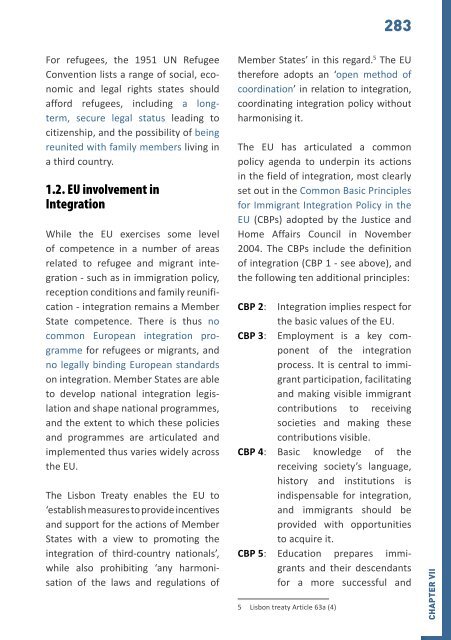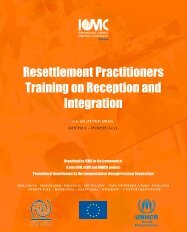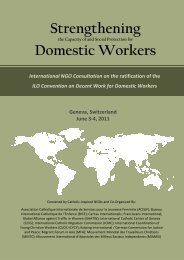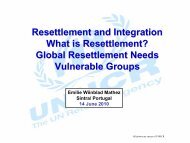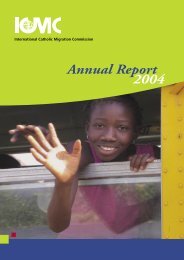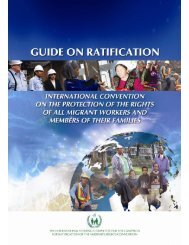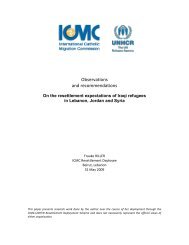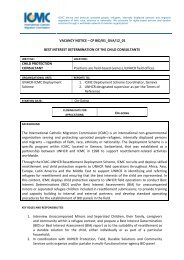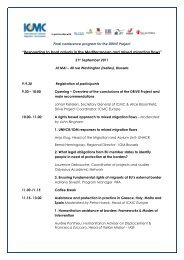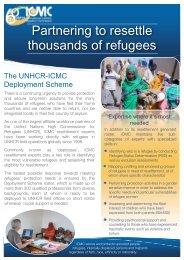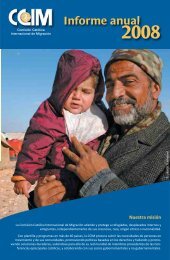ICMCEUROPE WelcometoEurope.pdf (5.89 MB)
ICMCEUROPE WelcometoEurope.pdf (5.89 MB)
ICMCEUROPE WelcometoEurope.pdf (5.89 MB)
You also want an ePaper? Increase the reach of your titles
YUMPU automatically turns print PDFs into web optimized ePapers that Google loves.
283<br />
For refugees, the 1951 UN Refugee<br />
Convention lists a range of social, economic<br />
and legal rights states should<br />
afford refugees, including a longterm,<br />
secure legal status leading to<br />
citizenship, and the possibility of being<br />
reunited with family members living in<br />
a third country.<br />
1.2. EU involvement in<br />
Integration<br />
While the EU exercises some level<br />
of competence in a number of areas<br />
related to refugee and migrant integration<br />
- such as in immigration policy,<br />
reception conditions and family reunification<br />
- integration remains a Member<br />
State competence. There is thus no<br />
common European integration programme<br />
for refugees or migrants, and<br />
no legally binding European standards<br />
on integration. Member States are able<br />
to develop national integration legislation<br />
and shape national programmes,<br />
and the extent to which these policies<br />
and programmes are articulated and<br />
implemented thus varies widely across<br />
the EU.<br />
The Lisbon Treaty enables the EU to<br />
‘establish measures to provide incentives<br />
and support for the actions of Member<br />
States with a view to promoting the<br />
integration of third-country nationals’,<br />
while also prohibiting ‘any harmonisation<br />
of the laws and regulations of<br />
Member States’ in this regard. 5 The EU<br />
therefore adopts an ‘open method of<br />
coordination’ in relation to integration,<br />
coordinating integration policy without<br />
harmonising it.<br />
The EU has articulated a common<br />
policy agenda to underpin its actions<br />
in the field of integration, most clearly<br />
set out in the Common Basic Principles<br />
for Immigrant Integration Policy in the<br />
EU (CBPs) adopted by the Justice and<br />
Home Affairs Council in November<br />
2004. The CBPs include the definition<br />
of integration (CBP 1 - see above), and<br />
the following ten additional principles:<br />
CBP 2: Integration implies respect for<br />
the basic values of the EU.<br />
CBP 3: Employment is a key component<br />
of the integration<br />
process. It is central to immigrant<br />
participation, facilitating<br />
and making visible immigrant<br />
contributions to receiving<br />
societies and making these<br />
contributions visible.<br />
CBP 4: Basic knowledge of the<br />
receiving society’s language,<br />
history and institutions is<br />
indispensable for integration,<br />
and immigrants should be<br />
provided with opportunities<br />
to acquire it.<br />
CBP 5: Education prepares immigrants<br />
and their descendants<br />
for a more successful and<br />
5 Lisbon treaty Article 63a (4)<br />
CHAPTER VII


